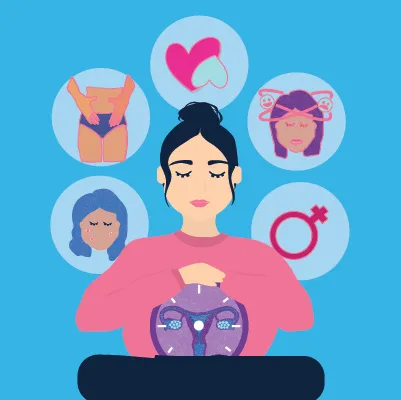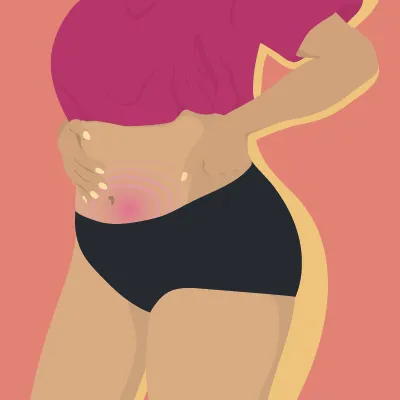Aug 20, 2025
Can You Develop PCOS? Understanding the Causes & Risk Factors
Okay, so let’s talk about something that doesn’t get enough attention: PCOS (aka Polycystic Ovary Syndrome). Maybe you’ve heard the term floating around TikTok or from a friend who’s dealing with it and now you’re wondering, “Wait… can you develop PCOS?” Totally valid question.
First up: What is PCOS, anyway?
In simple terms, PCOS is a hormonal condition that affects how the ovaries work. People with PCOS often have higher levels of androgens (aka “male” hormones), irregular periods, and sometimes small fluid-filled sacs on their ovaries (called cysts).
It can mess with your energy levels, skin, mood, and periods, so yeah, not ideal. But the thing is, it doesn’t just appear out of nowhere one day.
Can you develop PCOS?
Short answer: Yes. PCOS isn’t something you’re born with in the same way as, say, your eye colour. While it can have a genetic link, many people develop signs of PCOS later, usually during their late teens or early 20s (which is why it’s especially worth paying attention to if you’re in that age group).
So, if your period used to be regular and suddenly starts ghosting you or showing up unpredictably, or you’re breaking out more than usual, it’s totally fair to start asking questions.
What causes it, though?
Honestly, the full answer is still a bit of a mystery. But here’s what experts do know about its causes:
- Genetics: If your parent or sibling has PCOS, your chances of developing it go up.
- Insulin resistance: This is when your body struggles to use insulin properly, which can increase androgen levels. (Fun fact: around 70% of people with PCOS have some form of insulin resistance.)
- Inflammation: Chronic low-level inflammation might play a role too. And no, we're not talking about post-leg-day soreness, it’s more internal, on a cellular level.
- Lifestyle: While it’s not the cause, things like stress, poor sleep, or a diet that’s all fast food and no fibre can make symptoms worse.
So it’s kind of a combo deal: genes, hormones, and lifestyle factors can all come together and throw your body’s rhythm off balance.
So... what are the signs of PCOS?
Ah yes, the question that sparks endless Googling at 2am. The tricky part? The signs can be super varied. You might have some, all, or just one. That’s why a lot of people go undiagnosed for years.
Here are some common things to watch out for:
- Irregular periods or no periods at all
- Excess facial or body hair (hello, random chin hairs)
- Acne that won’t quit
- Thinning hair or hair loss on the scalp
- Unexpected weight gain or trouble losing weight
- Mood swings, anxiety, or low energy
Now, having one of these doesn’t mean you have PCOS, but if you’re noticing a pattern or things feel “off,” it’s worth chatting with a doc.
How is PCOS diagnosed?
Here’s the thing: There’s no single test that screams “yep, it’s PCOS.” It’s more of a process.
If you go to a healthcare provider, they’ll usually:
- Ask about your symptoms and cycle history
- Do a physical check (including skin, hair, and body hair)
- Order some blood tests to check hormone levels
- Possibly suggest an ultrasound to look at your ovaries
So yeah, how is PCOS diagnosed? It takes a mix of conversations, blood work, and maybe a scan, but it’s doable. The key is speaking up and being honest about what you’re noticing.
Can anything lower your risk?
There’s no surefire way to prevent PCOS (especially if it runs in your family), but keeping your hormones and blood sugar balanced can help.
That might mean:
- Moving your body regularly (walks, dancing, yoga: whatever works for you)
- Prioritising sleep (yes, doomscrolling at 2am counts against you)
- Eating a balanced diet with lots of fibre and protein
- Managing stress: easier said than done, we know
These small shifts won’t magically “cure” anything, but they can make a big difference in how you feel overall.
Final thoughts
If you’re in your late teens or early twenties and starting to notice weird changes in your body, don’t panic. You're not alone, and it's not in your head. Whether it's irregular periods, breakouts that won’t quit, or tiredness for no reason, it’s totally okay to ask, “Could this be a sign of something like PCOS?”
The best move? Keep track of your cycle, listen to your body, and reach out to a healthcare provider if things feel off. Catching the signs of PCOS early can make a big difference in how you manage it down the road.
Love, Libra x
Essity makes no warranties or representations regarding the completeness or accuracy of the information. This information should be used only as a guide and should not be relied upon as a substitute for professional, medical or other health professional advice.







